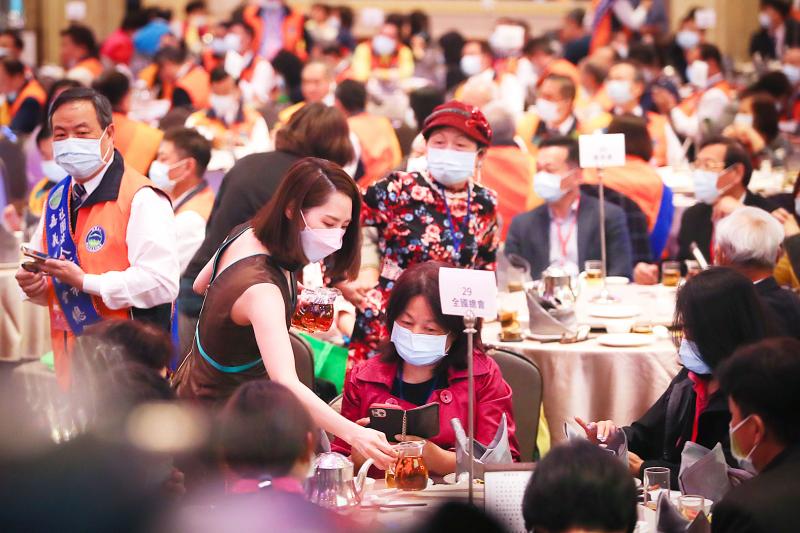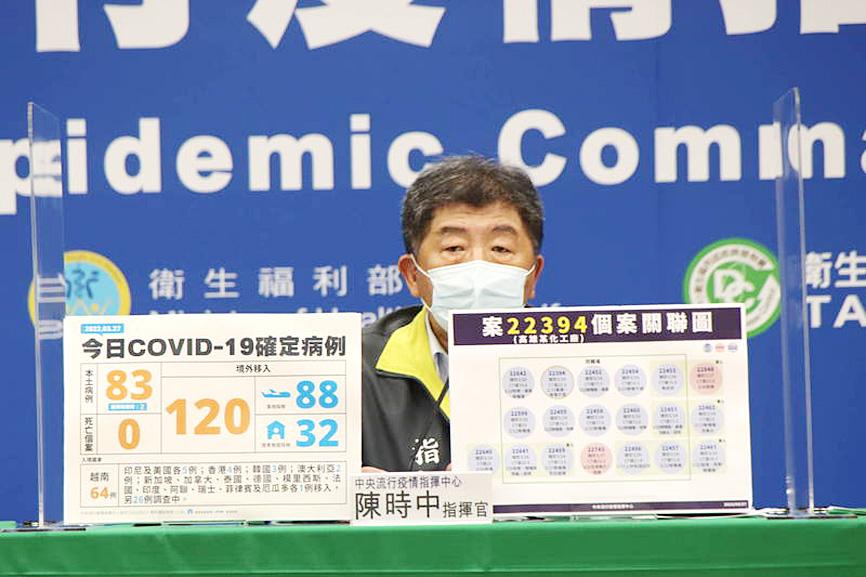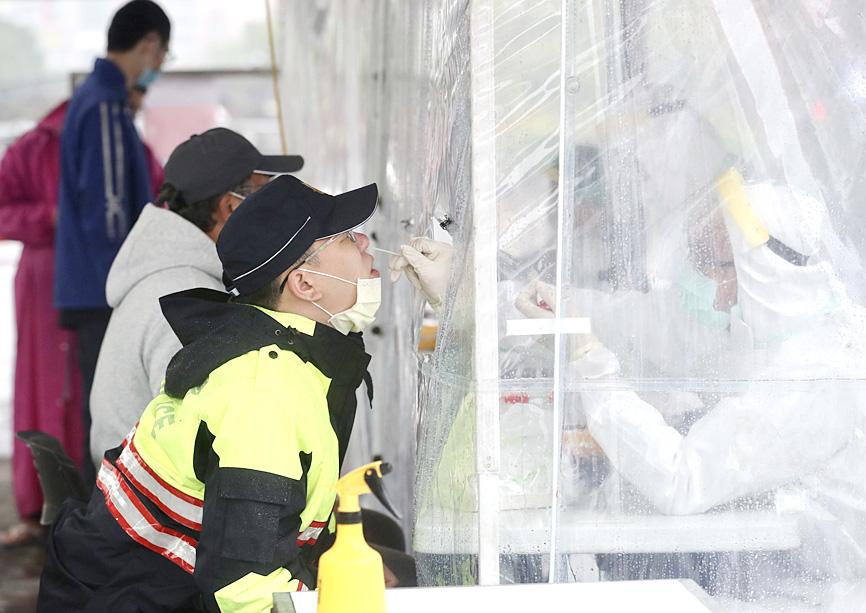The Central Epidemic Command Center (CECC) yesterday reported 83 local COVID-19 cases, including 52 linked to a construction site in Taoyuan and its workers’ dormitories in Hsinchu County.
Minister of Health and Welfare Chen Shih-chung (陳時中), who heads the center, said yesterday’s domestic caseload is Taiwan’s highest since June 27 last year, when 88 local cases were reported.
Yesterday’s local cases include a family of four in Taitung County. The initial case in the family cluster is a woman who tested positive after seeking treatment for a fever, vomiting and a sore throat, Chen said.

Photo: CNA
Four other local cases are linked to a case reported on Saturday, an insurance salesperson in New Taipei City’s Sanchong District (三重), he said.
The infection sources of the family cluster and the New Taipei City cluster are still unknown, he added.
Two other local cases are linked to a cluster infection involving workers at a chemical plant in Kaohsiung. The new cases are a worker at the plant and a family member of an infected worker who both tested positive during isolation, Chen said.

Photo courtesy of the Central Epidemic Command Center
Genome sequencing results from a case linked to the cluster showed that she was infected with the Omicron BA.2 subvariant of SARS-CoV-2, which is different from the Omicron strain previously detected in the nation, he said.
Two other local cases are linked to a cluster infection involving workers at a technology plant in New Taipei City’s Shulin District (樹林), Chen said.
The Kaohsiung chemical plant cluster has expanded to 19 cases and the Shulin technology plant cluster has expanded to 22 cases, CECC data showed.

Photo: CNA
Chen said that a new cluster — comprising 52 people — has been detected at a construction site in Taoyuan and its workers’ dormitories in Hsinchu County.
As many of the workers at the site had cold-like symptoms, the company conducted rapid tests on 56 workers on Saturday and 44 tested positive, Chen said.
All 68 workers at the dormitories underwent polymerase chain reaction testing before midnight, and 50 of them — 47 Thai and three Taiwanese men — tested positive, with cycle threshold values ranging from 11.4 to 29.6, he said.
Two more case — a worker who does not live in the dormitories and his girlfriend — tested positive in expanded testing, he added.
More tests and contact tracing are being conducted, Chen said, adding that the Ministry of Labor is helping with contact tracing by providing Thai translators.
Another cluster infection the center is closely monitoring is in Keelung, Chen said.
Nineteen new cases have been added to the cluster, expanding it to 27 cases: eight police officers, eight restaurant workers, seven people who ate at the restaurant and four family members or classmates, he said.
The Keelung City Government has set up several temporary testing stations, Chen said, adding that all Keelung police officers would be tested.
As an infected police officer had attended an award ceremony on Thursday in which Keelung Mayor Lin Yu-chang (林右昌) took off his mask to pose for a photograph with recipients on stage, Lin was on Friday advised by the CECC to self-isolate for three days.
The announcement prompted questioning by the public as to why Lin needed to isolate for only three days.
The center on Saturday said Lin is not considered a close contact of the confirmed cases, according to its standards.
However, Chen yesterday said that more police officers have tested positive and other attendees at the award ceremony might be infected.
He said that Lin has voluntarily asked for stricter monitoring and the CECC has placed him in isolation for 10 days, starting on Friday.
The CECC yesterday also reported 120 imported cases.

The paramount chief of a volcanic island in Vanuatu yesterday said that he was “very impressed” by a UN court’s declaration that countries must tackle climate change. Vanuatu spearheaded the legal case at the International Court of Justice in The Hague, Netherlands, which on Wednesday ruled that countries have a duty to protect against the threat of a warming planet. “I’m very impressed,” George Bumseng, the top chief of the Pacific archipelago’s island of Ambrym, told reporters in the capital, Port Vila. “We have been waiting for this decision for a long time because we have been victims of this climate change for

MASSIVE LOSS: If the next recall votes also fail, it would signal that the administration of President William Lai would continue to face strong resistance within the legislature The results of recall votes yesterday dealt a blow to the Democratic Progressive Party’s (DPP) efforts to overturn the opposition-controlled legislature, as all 24 Chinese Nationalist Party (KMT) lawmakers survived the recall bids. Backed by President William Lai’s (賴清德) DPP, civic groups led the recall drive, seeking to remove 31 out of 39 KMT lawmakers from the 113-seat legislature, in which the KMT and the Taiwan People’s Party (TPP) together hold a majority with 62 seats, while the DPP holds 51 seats. The scale of the recall elections was unprecedented, with another seven KMT lawmakers facing similar votes on Aug. 23. For a

Taiwan must invest in artificial intelligence (AI) and robotics to keep abreast of the next technological leap toward automation, Vice President Hsiao Bi-khim (蕭美琴) said at the luanch ceremony of Taiwan AI and Robots Alliance yesterday. The world is on the cusp of a new industrial revolution centered on AI and robotics, which would likely lead to a thorough transformation of human society, she told an event marking the establishment of a national AI and robotics alliance in Taipei. The arrival of the next industrial revolution could be a matter of years, she said. The pace of automation in the global economy can

All 24 lawmakers of the main opposition Chinese Nationalists Party (KMT) on Saturday survived historical nationwide recall elections, ensuring that the KMT along with Taiwan People’s Party (TPP) lawmakers will maintain opposition control of the legislature. Recall votes against all 24 KMT lawmakers as well as Hsinchu Mayor Ann Kao (高虹安) and KMT legislative caucus whip Fu Kun-chi (傅崐萁) failed to pass, according to Central Election Commission (CEC) figures. In only six of the 24 recall votes did the ballots cast in favor of the recall even meet the threshold of 25 percent of eligible voters needed for the recall to pass,